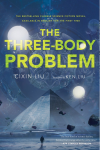The Hugos: Cixin Liu Wins,
the Puppies Lose
The 2015 Hugo Awards were presented Saturday in Spokane Washington during WorldCon, the annual World Science Fiction Convention.
 The Three-Body Problem, Cixin Liu, Ken Liu translator (Macmillan/Tor Books; Macmillan Audio; OverDrive Sample) won for Best Novel. An alien invasion story, it is the first English language translation of one of China’s top SF authors. It was reviewed on the NPR site last fall.
The Three-Body Problem, Cixin Liu, Ken Liu translator (Macmillan/Tor Books; Macmillan Audio; OverDrive Sample) won for Best Novel. An alien invasion story, it is the first English language translation of one of China’s top SF authors. It was reviewed on the NPR site last fall.
 Best Graphic Story went to Ms. Marvel Volume 1: No Normal, written by G. Willow Wilson, illustrated by Adrian Alphona and Jake Wyatt (Marvel Comics; GraphicAudio). The series stars a teenage girl, Kamala Khan, the first Muslim lead character in the Marvel universe. Here is a link to the audio.
Best Graphic Story went to Ms. Marvel Volume 1: No Normal, written by G. Willow Wilson, illustrated by Adrian Alphona and Jake Wyatt (Marvel Comics; GraphicAudio). The series stars a teenage girl, Kamala Khan, the first Muslim lead character in the Marvel universe. Here is a link to the audio.
 Guardians of the Galaxy, written by James Gunn and Nicole Perlman, directed by James Gunn (Marvel Studios, Moving Picture Company) won Best Dramatic Presentation, Long Form while Orphan Black: “By Means Which Have Never Yet Been Tried” written by Graham Manson, directed by John Fawcett (Temple Street Productions, Space/BBC America) won Best Dramatic Presentation, Short Form.
Guardians of the Galaxy, written by James Gunn and Nicole Perlman, directed by James Gunn (Marvel Studios, Moving Picture Company) won Best Dramatic Presentation, Long Form while Orphan Black: “By Means Which Have Never Yet Been Tried” written by Graham Manson, directed by John Fawcett (Temple Street Productions, Space/BBC America) won Best Dramatic Presentation, Short Form.
The John W. Campbell Award for Best New Writer went to Wesley Chu who has also won an Alex Award for The Lives of Tao (PRH/Angry Robot, 2013).
In response to accusations of ballot stuffing the nomination process, many voting members elected to select “No Award” rather than see the Hugo go to a title supported by the conservative group known as the “puppies” (see our overview of the controversy).
This occurred in the categories of Best Novella, Best Short Story, Best Related Work, Best Editor, Short Form, and Best Editor, Long Form, each of which were “won” by No Award. Many of these categories were either overwhelmingly affected by the ballot stuffing or only included “puppy” nominees.
In their liveblogging of the event, io9 said: “voting ‘No Award’ is a very legitimate choice, that’s always been possible. And it’s a very legit response to a small, tiny group of people trying to exploit a loophole in the nomination process to impose their choices on the vast majority of fans. This is fandom rejecting abusive behavior, and also saying that they want science fiction to have an open mind and consider many viewpoints.”
